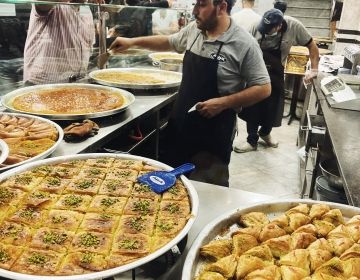An (Arab-) American in Jordan
I am half Egyptian, Muslim, don’t cover my hair, and speak minimal Arabic. This led to me having a very different study abroad experience from my friends of other ethnicities. I wanted to write a blog post to reflect on the intersections of identity that I had to confront while studying abroad, and how those compare to my experience with my identity in the United States.
“Where from?” is one of the most common questions I get from taxi drivers. It is a complicated question, because I have to parse if they are asking me why I look the way I do, or why I talk the way I do. If it is the former, the answer is “my father is Egyptian.” If it is the latter, the answer is “America.” When I visited Egypt, this question was even more complicated, because I have picked up a Jordanian accent in Arabic, so there was an additional possible answer to the question of why I talk the way I do. I tend to hesitate on this question, trying to guess the real question, and more often than not guess wrong.
Very often, people here will look at be and at the very least suspect that I am Arab, and will often default to speaking to me in Arabic, and to my white friends in English, even if we are together. However, since I am only half Egyptian, other times I pass as simply white, especially since I do not wear a hijab. Most Muslim women in Jordan do cover, and so there is sometimes an expectation that if you are not covered, you are either not Muslim or not Arab.
Once, at the Amman airport, I was with my (white) friend who speaks better Arabic than I do, and she was told not to try to speak Arabic, and just stick to English. Stumbling through the necessary phrases in Arabic to get through customs, he pointed at me and said to my friend, “see, she speaks Arabic!”
I got catcalled less often than my white friends as well. I suppose my white friends are something more “exotic” or unusual here, and thus more likely to be catcalled, which was surprising to me.
Being Muslim in Jordan has been an interesting experience as well. I don’t cover my hair, unlike a majority of Muslim women here, but am less often challenged when I say that I am Muslim than when I do in the United States. There seems to be more of a recognition here that it is possible to be Muslim without following the Qur’an to the letter, whereas in the United States we tend to have a more one-dimensional view of Islam, because we have a smaller sample to compare to.
While volunteering at an elementary school just outside of Amman, one of the kids asked me if I was Muslim, I said that I was, and then she started asking me how often I pray. The openness with which these kids asked about very personal religious choices caught me off guard, and I changed the subject.
Another aspect of being in a Muslim-majority country is that Islamophobia is practically nonexistent, and being Muslim is normalised to a degree I found daunting but comforting. Every day, five times a day, the call to prayer echoes across the whole city from hundreds of mosques. If you ever have the opportunity to sit on top of one of the mountains of Amman during the call to prayer, it is one of the most beautiful experiences ever. Bacon at restaurants is beef by default. Fridays are the weekend, allowing Muslims to observe their holy day. Restaurants will close during the day during Ramadan, so as not to taunt fasting Muslims with enticing food. The way that being Muslim is made easy in Jordan is going to be hard to leave in May, and return to the United States, where profiling and violence are unfortunately too common.
This is only a brief reflection on my experience, and it is not meant to be representative of every Arab-American’s experience in Jordan or the Middle East. Being only half Arab, not covering my hair, and speaking little Arabic gave me a different experience from a student who was entirely Arab, visibly Muslim, and spoke Arabic very well. Parsing the American and Arab aspects of my identity was an exercise I expected, but did not anticipate the degree to which it would influence my life here. If you are an Arab-American student preparing to study abroad in the Middle East, don’t be discouraged by this emotional work, but do be prepared to confront aspects of your identity that you may be taking for granted currently.
Related Posts
How to Pack Like a Pro
Studying abroad can be a life-changing experience, but it can also be overwhelming to pack for an extended stay in a foreign country. Here's a packing list for studying abroad... keep reading
Have a Sweet Tooth? Jordan Has You Covered.
Jordanian cuisine is rich and diverse, and the country's desserts are no exception. From sweet and sticky pastries to delicate floral-infused cakes, Jordanian desserts are a must-try for any foodie... keep reading
Must-Try Cuisine in Amman, Jordan!
Jordanian cuisine is a delicious and unique blend of flavors from the Middle East, North Africa, and the Mediterranean. Here are the five most famous Jordanian dishes that you must... keep reading




